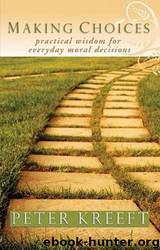Making Choices: Practical Wisdom for Everyday Moral Decisions by Kreeft Peter

Author:Kreeft, Peter [Kreeft, Peter]
Language: eng
Format: epub
Publisher: St. Anthony Messenger Press, Servant Books
Published: 2011-07-16T16:00:00+00:00
NINE
Telling the Truth
T WO THINGS ARE NECESSARY for us who want to fight for the restoration of truth. First, we must be convinced ourselves, and convince others, that there is truth, objective truth, both in general and in moral matters. Second, we must enter those areas of the battlefield where modern society has most damagingly undermined truth, and explore why these areas are so crucial to the battle for truth.
The first task can be accomplished in a relatively short space. The proof of the reality of objective truth can be summarized in a single paragraph. The second task, exploration of the four areas of modern social life where the battle is most crucial, will take up the rest of this chapter.
There must be objective truth because if there is not, then it is true that there is no truth. In other words, all forms of skepticism of objective truth refute themselves. “There is no truth"—is that true? ‘Truth is not objective"—is that truth objective? ‘Truth is not universal"—except that truth? “No one can know truth"—except you, I suppose? ‘Truth is uncertain"—is that uncertain? “All generalizations are false"—including that one? “You can’t be dogmatic!"—you say that very dogmatically. “Don’t impose your truth on me!"—but you just imposed your “truth” on me! “There are no absolutes"—absolutely? ‘Truth is only opinion"—so that’s only your opinion, then. Et cetera ad nauseam.
Telling the truth is the opposite of lying. But there is more to be said about the morality of truth than that. Many books about morality explore the question of what circumstances justify telling some lies, if any—e.g. , the Dutch lying to the Nazis about where they hid the Jews during the war. I want to explore another question, one that is less familiar but more important: What has happened to truth in our society? It is important to ask when and why we should tell the truth, but it is even more important to ask how we can tell the truth if we’ve stopped believing in truth.
The distinction between lying and telling the truth presupposes that there is such a thing as truth—that is, objective truth. Many of our society’s most “advanced” minds and most media opinion-molders have abandoned belief in objective truth as hopelessly backward, naive, and old-fashioned. It is much more likely that you believe in objective truth if you didn’t go to college. Alan Bloom began his best-selling book The Closing of the American Mind with this arresting sentence: “If there is one thing every college teacher in America can be certain of, it is that all, or nearly all, of the students in his class will disbelieve, or think they disbelieve, in objective truth.”
This is new. What is new in our society is not the practice of lying. Humanity has always done that. What is new is not even the more frequent practice of this vice. What is new is a loss of belief in the corresponding virtue. How can you tell the truth if you can’t know
Download
This site does not store any files on its server. We only index and link to content provided by other sites. Please contact the content providers to delete copyright contents if any and email us, we'll remove relevant links or contents immediately.
| Adult Ministry | Children's Ministry |
| Counseling & Recovery | Discipleship |
| Evangelism | Missions & Missionary Work |
| Preaching | Sermons |
| Youth Ministry |
The Secret Power of Speaking God's Word by Joyce Meyer(2700)
The Rape Of Nanking by Iris Chang(2619)
Chosen by God by R. C. Sproul(2033)
Crash the Chatterbox by Steven Furtick(1868)
Habits of Grace by David Mathis(1836)
Knowing God by J.I. Packer(1712)
How To Be Born Again by Billy Graham(1650)
Gospel-Shaped Marriage by Chad van Dixhoorn(1587)
A Prophet with Honor by William C. Martin(1580)
Peace with God by Billy Graham(1558)
Confronting Christianity by Rebecca McLaughlin(1487)
God's Smuggler by Brother Andrew(1423)
Angel Dreams by Virtue Doreen Virtue Melissa(1358)
Whisper by Mark Batterson(1335)
Missionaries by Norman Lewis(1324)
The School of Biblical Evangelism by Ray Comfort(1316)
The Truth War by John MacArthur(1305)
The Poems of Rowan Williams by Rowan Williams(1263)
Do Greater Things by Robby Dawkins(1232)
